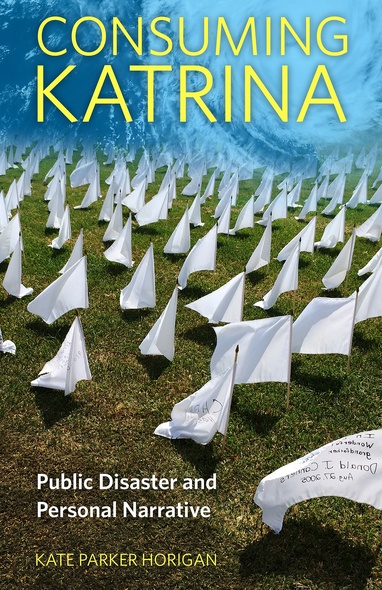
Consuming Katrina
Public Disaster and Personal Narrative
When and under what circumstances are disaster survivors able to speak for themselves in the public arena? In Consuming Katrina: Public Disaster and Personal Narrative, author Kate Parker Horigan shows how the public understands and remembers large-scale disasters like Hurricane Katrina, outlining which stories are remembered and why, as well as the impact on public memory and the survivors themselves.
Horigan discusses unique contexts in which personal narratives about the storm are shared, including interviews with survivors, Dave Eggers’s Zeitoun, Josh Neufeld’s A.D.: New Orleans After the Deluge, Tia Lessin and Carl Deal’s Trouble the Water, and public commemoration during Hurricane Katrina’s tenth anniversary in New Orleans. In each case, survivors initially present themselves in specific ways, counteracting negative stereotypes that characterize their communities. However, when adapted for public presentation, their stories get reduced back to those stereotypes. As a result, people affected by Katrina continue to be seen in limited terms, as either undeserving or incapable of managing recovery.
This project is rooted in Horigan’s experiences living in New Orleans before and after Katrina, but it is also a case study illustrating an ongoing problem and an innovative solution: survivors’ stories should be shared in a way that includes their own engagement with the processes of narrative production, circulation, and reception. When survivors are seen as agents in their own stories, they will be seen as agents in their own recovery. Having a better grasp on the processes of narration and memory is critical for improved disaster response because the stories that are most widely shared about disaster determine how communities recover.
Horigan’s book carefully and thoughtfully argues for the competence of storytellers and the responsibility of any mediator who is in the position of helping to make those stories known.
{W}e need more books like this; we need more voices, more perspectives, more analytical frameworks to enrich growing the scholarship on environmental humanities. Consuming Katrina will take a rightful place on my shelves and my own work will be the better for having read it.
Consuming Katrina is an important and compelling book about Hurricane Katrina in particular and trauma narrative in general. Kate Parker Horigan takes readers on an excursion through the multiple narratives about Hurricane Katrina, from personal narratives told by survivors to comics, film, and literature, from the early days after the disaster to the tenth anniversary commemorations. Horigan understands the personal stories told by survivors and the media representations within the larger context of discourses of disaster. Together, these stories, discourses, and representations constitute the public memory of trauma and contribute to or detract from efforts to recover and to claim ownership of the experience. The book belongs on the shelf of anyone interested in how we shape narratives and how narratives shape our lives in the wake of disaster.
Kate Parker Horigan meticulously traces commercial and institutional re-mediations of Katrina survivor experiences from the initial collaborations through the reception of their various products. With her precise identification of the mechanisms by which actors lost agency over their own stories and dominant narratives reasserted themselves, Horigan substantiates the suspicions of many New Orleanians: ‘the insatiable appetite for disaster stories’ does not ultimately benefit the individuals whose experiences are set forward for public consumption.
Even among the countless books on Hurricane Katrina, Consuming Katrina occupies a place distinctly its own as a champion of disaster survivors’ storytelling rights. Kate Parker Horigan’s guiding principle is that every journalist, scholar, or artist who seeks to help survivors tell their stories must allow them to speak for themselves. In a series of brilliant close readings, Horigan reveals the myriad, often unconscious ways in which outsiders’ stereotypes, misunderstandings, and personal agendas obscure survivor accounts, and she celebrates those moments when survivors’ voices do succeed in breaking through. Everyone who studies disaster narratives, as well as everyone who wonders how disaster survivors feel when others retell their stories, needs to read this book. And, everyone who has had to suffer through a disaster will find an understanding friend in Horigan and great support and solace in Consuming Katrina.
Kate Parker Horigan is assistant professor in the Department of Folk Studies and Anthropology at Western Kentucky University and associate editor of the Journal of American Folklore.





